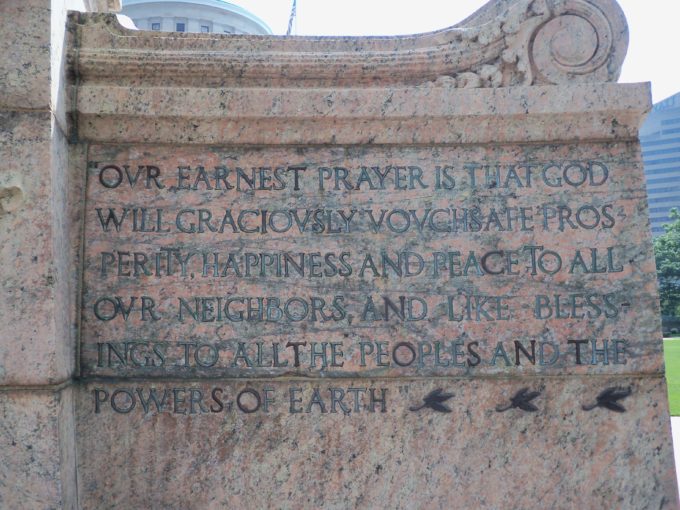
Tuesday, 8 October 2019
He indeed was foreordained before the foundation of the world, but was manifest in these last times for you… 1 Peter 1:20
Peter makes a statement now which confirms what he said earlier in verses 1:10-12. There he mentioned the prophets who spoke of the coming Christ – what He would do, who He would minister to, etc. Even though their writings were veiled to them, their words showed that what occurred in Christ was not merely chance or happenstance, but rather it was intentionally designed and spoken of in advance. And so, he says, “He was foreordained.”
The correct translation is “He was foreknown.” The idea of His being foreordained is also taught in Scripture. For example, prophecies about Him speak of His crucifixion. This means that it was certainly foreordained. It was something that was planned in advance to occur. That is not what Peter is speaking of here. Rather, he is referring to knowledge concerning the works of Christ, as noted above (what He would do, who He would minister to, etc.).
The difference is important to show that God not only planned for His advent and work in advance, but that the knowledge of this was also provided in advance. This is then to support our faith in the occurrence. It is good to have faith in something, but without a reasonable basis for that faith, there is nothing to actually support it. But in the next verse, this is what Peter will state concerning what the foreknowledge of Christ was for – believing God and having properly directed faith and hope in Him.
Peter then says that this foreknowledge was “before the foundation of the world.” Everything about what Christ would do was foreknown. The plan was determined before the first particle of mass was created or the first tick of the cosmic clock began. God would be in Christ, reconciling the world to Himself, and the entire plan was foreknown, to the minutest detail. The fact that Lot would sleep with both of his daughters, and then the descendants of both of those unions would lead to Christ, was known.
The union of Boaz and Ruth, and all of the details of how that would come to pass, was known to God. And, and that union was a part of the unfolding genealogy which led to Christ as well. Everything that went into the human lineage of Jesus was carefully determined and was foreknown. And with that knowledge came the record of those particular stories and the utterances of the prophets. All of these records were given to solidify, in the hearts and minds of the people, that Christ Jesus is truly the center of God’s redemptive plans, and – therefore – our faith in Him is firm and sure.
Peter then says, “but was manifest in these last times for you.” Here a change in the tense of the verbs occurs. The word signifying “foreknown” is a perfect participle (having been foreknown). It is a complete thought that was known and remains known from before creation even to the present time. The idea here, though not identical, is similar to the words of Hebrews 13:8 which says, “Jesus Christ is the same yesterday, today, and forever.” The two ideas harmonize in the fact that what was known about Jesus is revealed in Jesus. He has been foreknown, and in Him there is no change.
The second verb, which is translated as “was manifest,” is in the aorist tense. What occurred happened at a specific moment in time. This is what the prophets (mentioned above) searched diligently to know. They understood that the divine hand of inspiration which was upon them spoke of something specific, and that it certainly would come to pass. But as Peter said then, “To them it was revealed that, not to themselves, but to us they were ministering.” This is what he says again here. Their words which spoke of Christ were for our benefit, and then Christ was made manifest – as they prophesied – for us.
The idea of “these last times” speaks of the current dispensation. The time of the law had passed, and the age of grace began. It is an indeterminate amount of time which will end according to God’s pre-ordained plan for the ages. Until then, believers in Christ are living in what is referred to here as “these last times.” As Peter is speaking to the Jewish believers specifically, the idea of the last times includes the understanding of their Messiah at both the beginning and the ending of the current time, just before the millennial kingdom. Because of this, “these last times” certainly include the final seven years that comprise the tribulation period which comes just prior to the millennium. Peter will complete this thought in the next verse.
Life application: Genesis 1:1 says, “In the beginning God created the heavens and the earth.” There was a point when time began, before which it didn’t exist. Einstein realized this when he postulated the Theory of Relativity. This means that the incarnation and work of Jesus Christ was determined before time itself. This isn’t a misreading of one verse either. Revelation 13:8 repeats this amazing concept –
“All who dwell on the earth will worship him, whose names have not been written in the Book of Life of the Lamb slain from the foundation of the world.”
This verse is speaking of unbelievers who have rejected the “Lamb slain from the foundation of the world.” Instead, they turn to the antichrist in worship and adoration. The point not to miss from Peter’s words though is that Jesus Christ, God incarnate, was destined for the horrors of the cross before time, space, or matter existed. The mind of God, which is infinite in knowledge, saw our sin and rebellion, and purposed that instead of us being cast into hell, He would accept the punishment in the body of Jesus.
The next time you determine to click on a porn site for a peek, steal a pack of gum for a kick, lie to your boss about why you came to work late – or a zillion other sins of the flesh – remember that Jesus’ suffering came about because of our rebellion and it came at a point when the matter which comprises our physical bodies had not yet been created. We are accountable to the One who spoke us into existence. Remember this and be holy, even as He is holy.
Amazing love – that You, O God, could look through the immense continuum of time to the moment we would live, and seeing all of our sins, You would still allow us to be born and live. We have rebelled, we have turned from You, we have done wickedly, and yet You still loved us enough to send Jesus to die for the sins we have committed. And You sent Him even before we had done these things. What amazing love! What amazing grace! Thank You for our Lord Jesus. Amen.




